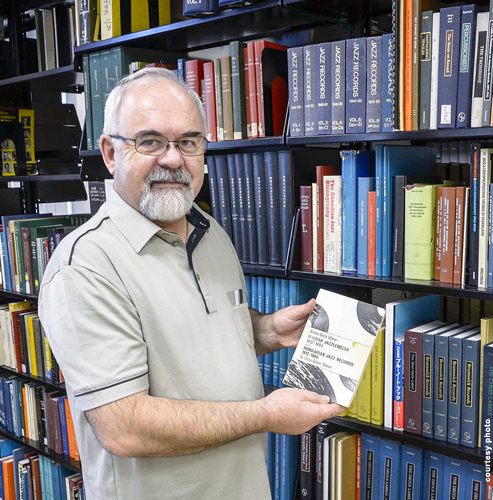Institute of Jazz Studies hosts international Fulbright scholar
Sometimes, college friends can influence a person’s taste in music, art, and political expression. In Gabor Turi’s case, his college friends’ tastes helped him find his way into a successful career that blended a love of jazz with journalism, civil service, academia, and now a major book project supported by a Fulbright scholarship.

Gabor grew up during the cold war, in Communist-dominated Hungary. In his early years he had little exposure to jazz, which was initially banned in the Eastern Bloc as decadent Western music but was tacitly allowed in the 1960s and later. When Gabor arrived at the Lajos Kossuth University in Debrecen in the early 1970s, his roommates came with some records and tapes of jazz music and shared their music tastes with him.
Gabor grew to love the music and culture of jazz and particularly favored ‘free jazz,’ an avant-garde trend that encouraged improvisation and creative performing styles. He also grew to appreciate the jazz’s association in the United States with the Black Consciousness movement and the Civil Rights struggle, political phenomenon that resonated deeply among many in the communist country.
With the more relaxed government attitude towards jazz, avenues for exposure to jazz opened – records, albeit through Eastern import, were sold, a jazz café run by the Communist Youth Organization opened, and a jazz conservatory was established. Most notably prominent Hungarian Public Radio host Imre Kiss regularly featured jazz artists on his program and helped establish annual jazz festivals, with American jazz artists, in major cities in Hungary.
The developing music culture in his country presented Gabor with a unique opportunity to combine his passion for jazz with his academic degrees in history, English, and journalism. He started working as a journalist for a county newspaper, first writing about domestic politics but soon moving to cover culture, theater and jazz. His work was well respected and in a few years he began publishing articles on jazz topics in national and international newspapers.
Gabor became increasingly active and prominent as a jazz journalist, serving as the Hungarian correspondent for Jazz Forum, the magazine of the International Jazz Federation, and was twice elected Vice President of the Hungarian Jazz Federation. He traveled internationally and covered major jazz festivals, concerts, and cultural activities. He also published three books on jazz – a collection of interviews with Hungarian musicians, a guide to jazz in Hungary, and a commentary on improvised music.
With the fall of communism in Russia and the Eastern bloc in 1990, the landscape of jazz in Hungary rapidly changed. With an open political system, regular citizens began to travel to music festivals on their own and commercial enterprises could publish music without government oversight. Yet the new system also challenged jazz musicians, who now faced reduced government support and had to work harder to find their audiences and build a following. Despite its strong and loyal following, jazz is not a broadly popular music genre so the liberalized social climate led to a retraction of opportunities for jazz artists and fans.
The changed political climate also opened new opportunities for Gabor. He served as a cultural attaché in the Embassy of Hungary in London, UK, a press attaché in the Embassy of Hungary in Washington, DC, deputy mayor of the city of Debrecen, and counselor on international affairs for the city council of Debrecen. He then moved to academia, taking on the role of director of the Center for External Relations at the University of Debrecen.
All the while, however, his love for jazz and all it symbolizes remained strong. So in 2012 he decided to apply for a scholarship from the Hungarian American Fulbright Commission for Educational Exchanges, to pursue a major book idea he had been mulling over for years – a chronicle of the development and status of jazz in the county of its birth, the United States, over the last 100 years. The book would examine jazz from the perspective of its three core constituencies; the creators (musicians), the mediators (business interests), and the consumers (audiences).
Gabor was delighted when the Fulbright Commission selected his proposal, one of only thirty selected from a pool of 150 applicants in Hungary that year. After considering a few options, Gabor soon chose the Institute of Jazz Studies in the John Cotton Dana Library as his home base for the three-month visit to the US afforded by the scholarship.
As Gabor reports, the choice of IJS was a very sensible one because of its sizeable archive focused entirely on jazz (the largest in the US), its connection to a major university, and its proximity to New York City. Since his arrival at IJS in September Gabor has been gratified by the support he’s received from the staff at IJS and feels that they share a strong bond, because they all speak the language of jazz. He is also very impressed with the level of university caliber scholarship devoted to jazz at Rutgers, which he contrasts with the ‘magazine level’ scholarship available in his home country.
Vince Pelote, interim director of IJS, relates a mutual admiration for Gabor: “We are thrilled to have Gabor Turi as a visiting Fulbright scholar, because it further enhances our reputation as the premier archive and library devoted to jazz. Mr. Turi is a noted jazz critic in Hungary and he recognizes the importance of the Institute’s resources in completing his research on the socio musicological aspect of how jazz music is kept alive in the country of its origin.”
The Rutgers University Libraries wish Gabor much success in his travels and research in the US. And we look forward to the publication of his book, which is certain to add a uniquely informed perspective on the growth and current state of jazz.
(http://www.libraries.rutgers.edu/news/institute-jazz-studies-hosts-inter...)
